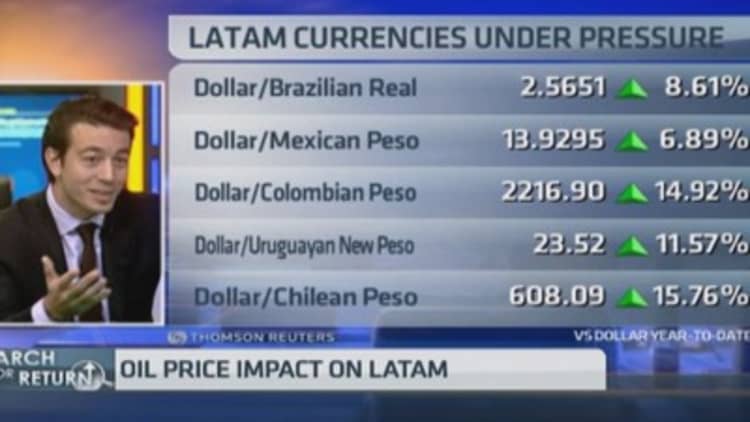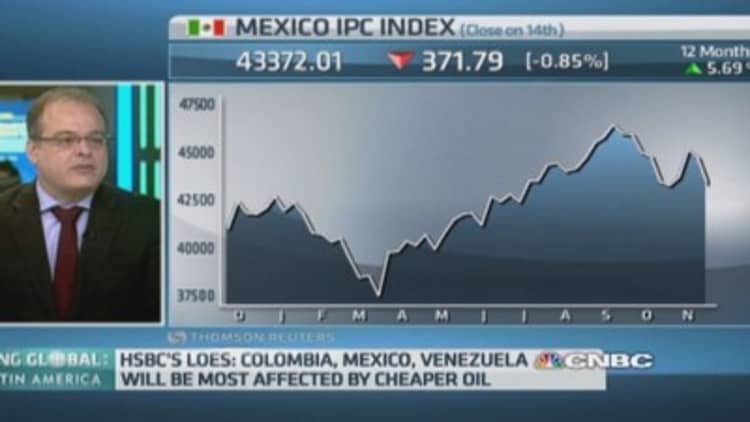Falling oil prices have side-swiped Venezuela's government finances, spurring concerns of a sovereign default, but it isn't clear whether contagion effects will emerge.
"Both the government's willingness and ability to service its foreign currency debt is in serious question," Capital Economics said in a note last week, citing declining oil prices.
Read More Venezuela's future? 'Barbarity and people looting'
"Given that the government has nothing in the way of savings from the oil price boom of the past decade, the loss of oil revenues will wipe out whatever foreign currency that the government has," it said. "With the bolivar collapsing in the black market, capital flight is only likely to increase putting even more pressure on the supply of hard currency."

It expects a default is "more likely than not" within two years, although there may not be a "flashpoint" until September or October of next year, when $5 billion of debt payments come due.
Unprepared
Among oil producing counties, Venezuela may be the worst prepared for lower oil prices, with dwindling reserves and a budget deficit of 17 percent of gross domestic product (GDP) . Oil accounts for 95 percent of Venezuela's export earnings and, combined with gas, it's 25 percent of the country's GDP. Rampant inflation has pushed consumer prices up as much as 50 percent a year, while currency controls have caused shortages of many consumer goods.
Read More Why Venezuela is so desperate, in 5 easy charts
Since this summer, Brent fell from above $115 per barrel to $70, and oil analysts predict oil prices will keep declining below $70 for Brent and even more for crude. Some estimates put the break-even price for Venezuela to balance its budget at around $121 a barrel.
"Venezuela was already knee-deep in a financial and political crisis before oil prices began to slide," Nicholas Spiro, managing director at Spiro Sovereign Strategy, said via email. "The fact that default is now being considered as an option shows the extent of the oil-exacerbated deterioration in the country's creditworthiness and economy. Indeed, some economists advising the opposition movement claim the country has already defaulted on its citizens and contractors and should stop prioritizing its foreign bondholders."
To be sure, not everyone expects a default anytime soon.
"We have no concerns over Venezuela's capacity to pay in the one-year outlook," said Diego Moya-Ocampos, senior political risk analyst for the Americas at IHS. But he added that beyond 2015, that assessment of a low default risk could change as the government has shown little political will to make policy adjustments ahead of next year's parliamentary elections, which may be held as late as September.
"We're not seeing the needed economic adjustments that the country needs to take if they are to improve the public health of their finances," such as easing foreign-exchange controls and price controls, Moya-Ocampos said. Indeed, he noted that a new law won't allow foreign investors to repatriate profits for five years. He also cited concerns that if the government cuts its fuel subsidies, a key drag on the budget, it will trigger protests.
"It creates a perfect storm for an economic and political crisis," he said.
But even if Venezuela does default, it's not clear if it will have serious knock-on effects in other markets.
"We doubt it would come as a big shock to investors if Venezuela were to default sometime soon," as yield spread on the country's debt is already up by around 1,000 basis points over the past six months, Capital Economics said in a separate note Wednesday. It noted that the spreads on the bonds of other countries in the EMBI+ emerging market bond index have gone up very little or have even declined, suggesting investors will continue to differentiate.
Read More Why the strong dollar may sink junk bonds
Venezuela also doesn't have much of a weighting in emerging market bond indexes, at around 2.5 percent of the JPMorgan EMBI Global Core Index of U.S. dollar-denominated emerging market debt.
But some believe a default could have wider effects on markets.
"[An outright default] could turn it into something of an 'energy pariah,' seriously undermining its ability to trade," Spiro said. "For a country with the largest oil reserves in the world and -- in stark contrast to Argentina -- a history of being a strong creditor, a default would have ruinous consequences for Venezuela and would be far more damaging to sentiment than Argentina's default earlier this year."
An ongoing effort
Venezuela is taking some steps to shore up its finances

Moody's cited a "credit positive" from the country's decision to sell to Goldman Sachs some of the debt that the Dominican Republic owes it for oil purchased under the Petrocaribe oil financing program for $1.75 billion, or around 41 percent of the $4.1 billion face amount of the low-interest debt. Media reports also indicate Goldman Sachs could buy Jamaica's Petrocaribe debt obligations to Venezuela, Moody's said.
Read More Will OPEC bankrupt US shale producers?
"The cash will alleviate pressure on foreign currency liquidity in Venezuela and make it more likely that the sovereign will be able to continue to service its external debt and avoid a default over the next 12 months," Moody's said. It estimated Venezuela's official non-gold reserves are less than $7 billion, which it called relatively low given the economy's size, with the "freely available and useable" foreign reserves at just $3.5 billion.
Risks remain
But the move isn't an unalloyed positive, noted Moody's, which already rates the country at Caa1, indicating very high credit risk, with a negative outlook.
"A repeated sale of assets not only signals government authorities' growing concern about foreign currency availability, but also decreases the underlying strength of the public sector balance sheet," it said.
Read More Cuba is Venezuela's biggest loser
Additionally, if Venezuela defaults, it isn't clear if global oil companies would also take a hit.
State-owned oil company PDVSA obtained nearly $10 billion in advances from foreign partners including Chevron, Gazprom, ENI and CNPC to help boost production in joint-venture oil fields.
While these are large, diversified energy companies, it may make markets nervous about other oil players. The prices of high-yield energy bonds have taken a hit recently as falling oil prices have spurred doubts on repayment. Oil and gas companies account for around 15 percent of the Markit iBoxx index for high-yield bonds.
But IHS' Moya-Ocampos noted that Venezuela may be able to keep a default at bay by selling parts of those joint projects with foreign companies. While the government generally holds 60 percent of its joint ventures within the country, the law only requires it to keep 50.1 percent, he noted.
In addition, Venezuela still has significant assets abroad that can be sold, including its holding of Citgo in the U.S.
—By CNBC.Com's Leslie Shaffer; Follow her on Twitter @LeslieShaffer1


